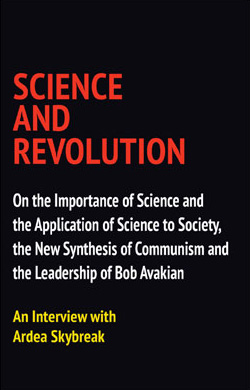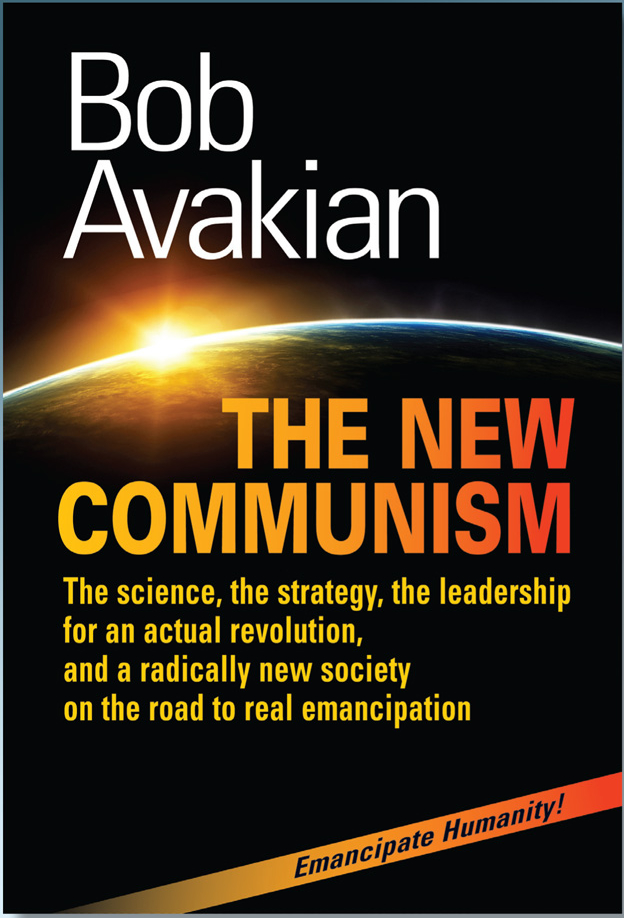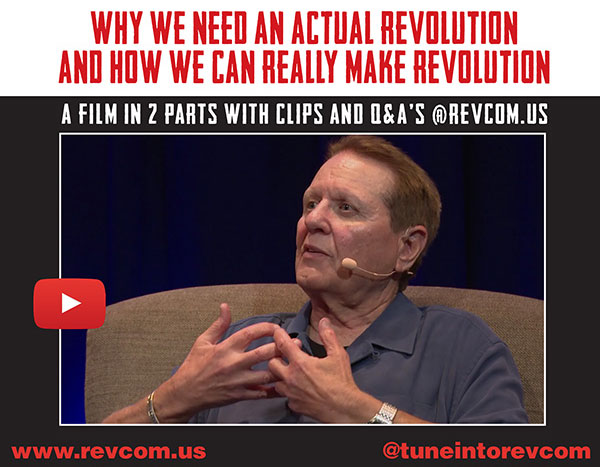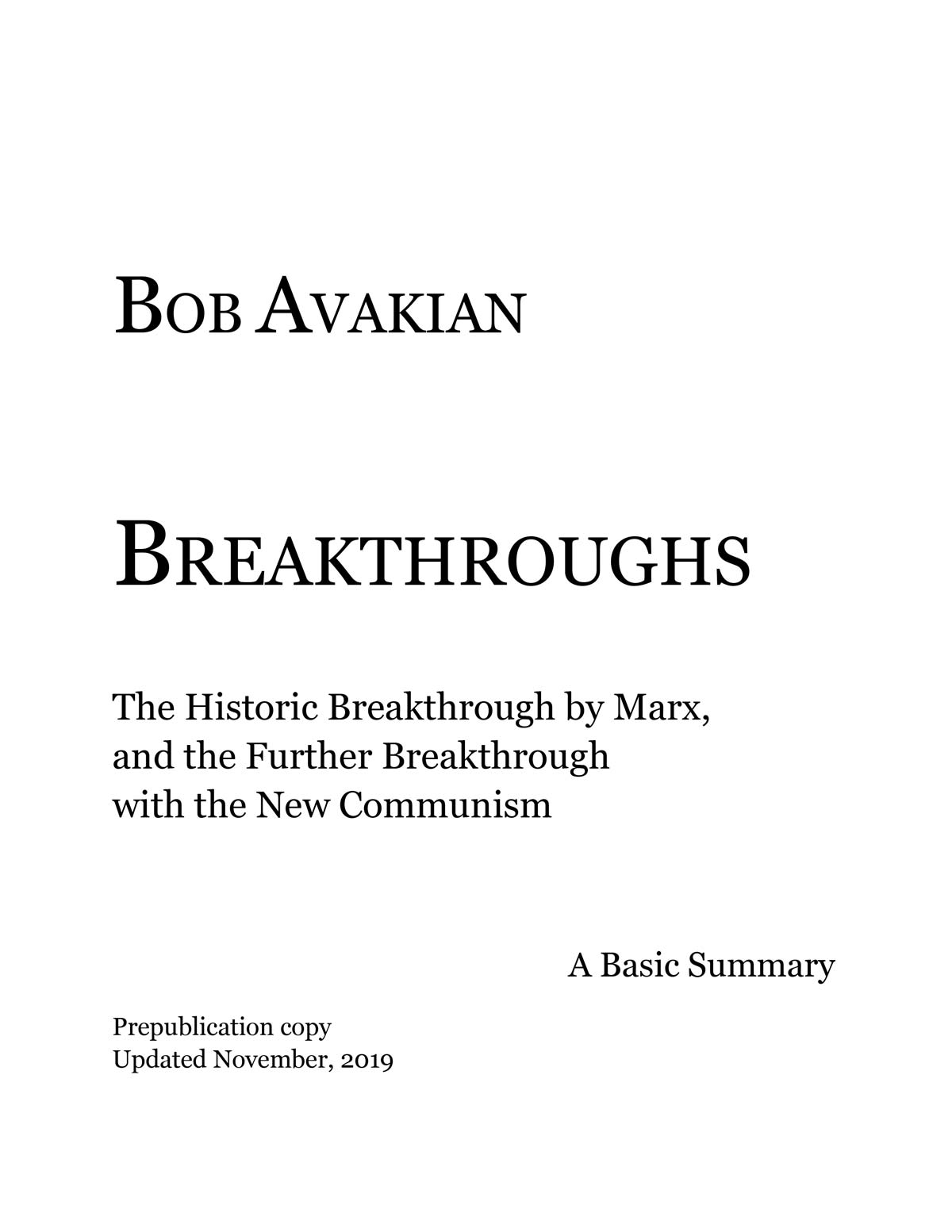The coronavirus crisis has brought home very sharply the importance of science—the scientific method and approach to understanding and changing the world. But there is a big problem in how people have been trained and conditioned to think (or not think). Even as people in the medical field are proceeding on the basis of a scientific approach and, in the context of this coronavirus crisis, “liberals” are insisting that it is vitally important now to “listen to the scientists,” for far too long many “liberals” and “progressives” have allowed themselves to become paralyzed by relativist agnosticism, lacking—and often even rejecting the very idea of—certitude (with ridiculous notions like “How can you know what is really true, no one can say that their truth is greater than someone else’s truth,” and so on). Meanwhile, fascist forces, marked by a truly dark ages mentality, and firmly convinced of the “truth” of all manner of lunatic conspiracy theories promoting fascist “values” and objectives, are eagerly embracing callous philistinism, willfully rejecting critical thinking, smugly ignoring, defying and denigrating science and the scientific method.
Put another way, in terms of major trends in society as a whole: Those who have the most certitude are those most out of touch with reality.
Further complicating the situation and an additional dimension to this problem is the fact that, although they do not share but strongly oppose the “values” and objectives of the fascists, many of the basic masses, who are bitterly oppressed under this system, also are suspicious of and even are inclined to reject science and scientifically-grounded analysis. But this also leaves you vulnerable to all kinds of unfounded “conspiracy theories” and other wrong and harmful ideas, including the notion that nothing people do will make a difference because “it’s all in god’s hands.”
The answer to all this is not giving up on understanding reality, or simply believing what sounds like it makes sense, or what is said by someone you know, or what gives you comfort (at least for a while). The truth of something does not depend on who says it, or how it makes you feel. Because something comes from a source you like does not make it true; and because something comes from a source you do not like does not make it untrue. And truth is not a “popularity contest.” Because a lot of people believe something does not make it true; and because only a few people believe something does not make it untrue.
Truth is objective—which means: Whether something is true or not depends on whether it corresponds to actual reality. (On some levels, the truth of things is obvious—for example, the truth that if it is raining hard and you are exposed to the rain for any length of time, you will get wet. But there are deeper levels to things, and the truth about them is more complex and requires more developed knowledge—for example, what causes rain, why it is raining where you are and not somewhere else, and so on. But in all cases, on all levels, the fact remains: Whether something is true or not depends on whether it corresponds to actual reality.) To sort out what is false from what is true and to stand on solid ground in terms of understanding things, you need the scientific method and approach to reality—and, yes, scientifically-grounded certitude, where such certitude can and must be established.
Science is not another “dogma”—another untested and unproved “set of beliefs”—it is the opposite of that. Conclusions based on the application of the scientific method are obviously important, but science is not just some “collection of conclusions,” and still less is it a set of “precepts” which are not drawn from reality and are out of keeping with reality, or which once reflected reality but have become frozen and “ossified” and no longer correspond to a changing reality. Science is above all and most essentially a method. In this regard the following, from an interview with Ardea Skybreak, a professionally trained scientist and an advocate of the new communism as a further advance in the science of revolution, is very relevant:
So I think it might be worth starting a little bit by talking about what is science, to demystify it a little bit. I mean, science deals with material reality, and you could say that all of nature and all of human society is the province of science, science can deal with all that. It’s a tool—science—a very powerful tool. It’s a method and approach for being able to tell what’s true, what corresponds to reality as it really is. In that sense, science is very different than religion or mysticism, or things like that, which try to explain reality by invoking imaginary forces and which provide no actual evidence for any of their analyses. By contrast, science requires proof. It requires evidence. It is an evidence‑based process. That’s very important. Science is an evidence‑based process.1
If you don’t judge things by whether there is compelling evidence for them—and if you don’t evaluate what people claim by weighing it against what the evidence shows about the actual reality—you can end up believing almost anything! Or, as Skybreak puts it:
Without science you are at the mercy of being manipulated, of having your thinking manipulated and not being able to tell what’s right from what’s wrong, what’s true from what’s false.2
And:
Whether you’re talking about the material reality of a disease, of a natural ecosystem, or of a social system that human beings live under, science allows you to analyze its components, its history, how it came to be the way it is, what it’s made of, what are its defining characteristics and underlying contradictoriness (and we’ll come back to that) and therefore also what is the basis for it to change, or to be changed, if your intent is to change it. Whether you want to cure a disease or make a better society, you need that scientific evidence‑based process.3
Skybreak emphasizes the point that science is not mysterious, but is something that anyone can learn and apply. She also speaks to the contradiction that sometimes people are turned off to science, partly because they have been given the wrong sense of what science is, and
Another reason people are sometimes turned off by science is because there has been bad science....sometimes in the course of history science has been used to promote the idea that some races are inferior to other races....Well, that’s junk science. In fact you can use rigorous scientific methods to prove that that was all bad science. It’s not just “morally” bad—it is that, but it’s also scientifically bad—it’s completely false and you can use good science to prove that.4
As I have put it, in line with the essential point made by Skybreak:
It is the “good science”—the scientific method and approach of proceeding from the evidence about reality to understand how reality actually is, why it is the way it is, and how it is changing and could be changed further—that we need to consistently apply if we want to transform the world to uproot oppression and exploitation.5
Consistently Applying a Scientific Method, Following the Truth Wherever It Leads
Far too often, and with no small amount of irony, educated middle class “liberals,” “progressives” and the “woke” act as if they are asserting some profound truth when they reject the very notion of “truth” and decry and denounce as dogmatic (or even tyrannical) those who say that they have arrived at certain definite truths. But, once again, opposing the scientific method and approach—and denying the possibility of arriving at important truths by applying this method and approach—can only lead to bad, sometimes extremely bad, results, leaving people weighed down by all kinds of ignorance and prejudice, depriving people of the ability to understand and change the world in a fundamentally positive direction. And is this approach—of denying the possibility or desirability of knowing the truth and denouncing those who say they have brought forward definite important truths—is this really valid and viable, something people can or should stick with? When, for example, Jonas Salk announced that he had finally developed a vaccine to deal with the terrible disease polio, should the response actually have been to be suspicious of this claim and reject it without even looking into it, and to criticize (or even ostracize) Salk for having the nerve to claim that he arrived at an important truth (an understanding of the disease polio and how to combat it)? Should people actually respond in that way if, or when, a vaccine is developed for COVID-19?! Examples of this kind could be cited almost endlessly.
As I have emphasized, speaking to what is a fundamental epistemological principle of the new communism:
The truth is an actual correct reflection of reality, including in its motion and development. And, of course, it is true that nobody can ever have all of the truth. That’s part of understanding reality correctly, part of the scientific method. But...it is true that you can come to definite and definitive determinations about the reality of many particular things, even while you always have to be open to learning more, and to the possibility that some of what you thought to be true may not turn out to be true, or new developments occur which mean that the world has changed in such a way that your understanding has to be modified. That’s all part of the scientific method as well. When we talk about the truth, we’re not talking about THE TRUTH as an absolute and final truth, but we are also not talking about a narrative. We’re talking about a scientific approach to understanding reality and then, on that basis, transforming it. And the scientific approach to that process of analyzing and synthesizing reality can come to important definitive conclusions, even as this is an ongoing process which is never complete because you can never grasp all of reality—including because it’s constantly changing and because there will always be aspects of reality that human beings will not even have penetrated at any given time, let alone come to understand.6
There is a definite connection between the relativism and agnosticism of far too many educated middle class “liberals” and their reluctance, if not stubborn refusal, to recognize the fascist danger posed by the Trump-Pence regime for what it is and what is required in the face of this—which is a determined struggle against this fascism, a struggle that does not rely or depend upon the “mainstream” section of the ruling class (as represented by institutions like the Democratic Party) and the system they serve, which has given rise to this fascism (out of whose basic contradictions this fascism has arisen as an attempt at a resolution of these contradictions within the confines of this system and in the most extreme terms).
Even more fundamentally, there is a definite connection between the relativism and agnosticism of such “liberals” and their resistance or stubborn refusal to apply a consistently scientific evidence-based approach, and on this basis to follow the truth wherever it leads, particularly when it comes to historical, social and political questions—because where it leads is to demolishing cherished illusions and prejudices of “liberals” regarding the actual role of this “great American democracy,” throughout its history and throughout the world; the actual nature of the system we live under, capitalism-imperialism; and the actual experience of revolutionary struggle against this system, and more particularly the experience of the communist movement and the socialist societies it has brought into being.
It is in deeply engaging these questions, and drawing from many different dimensions of human experience, that I have brought forward a new communism, which is a continuation of, but also represents a qualitative leap beyond, and in some important ways a break with, communist theory as it had been previously developed and which has put communism on an even more consistently scientific basis, providing the strategy and leadership for an actual revolution and a radically new society on the road to real emancipation.
In regard to all this, it is worth repeating the very important point emphasized by Ardea Skybreak:
Whether you want to cure a disease or make a better society, you need that scientific evidence‑based process.
And specifically in terms of making a better society—in opposing the fascism of the Trump-Pence regime, and even more fundamentally in making a radical leap beyond this capitalist-imperialist system (which has given rise to this fascism) and bringing into being a far better world—you need the scientific method and approach of the new communism.
1. SCIENCE AND REVOLUTION, On the Importance of Science and the Application of Science to Society, the New Synthesis of Communism and the Leadership of Bob Avakian, An Interview with Ardea Skybreak, emphasis in the original. Ardea Skybreak is a professionally trained scientist in the field of ecology and evolutionary biology and an advocate of the new communism brought forward by Bob Avakian. Skybreak is also the author of the very important book The Science of Evolution and the Myth of Creationism: Knowing What’s Real and Why It Matters, Insight Press, 2006. The entire interview with Ardea Skybreak (SCIENCE AND REVOLUTION) is available at revcom.us.
In this interview Skybreak goes in some depth into how, in summing up the historical experience of the communist movement and drawing from a broad range of human experience, Bob Avakian has brought forward a new communism that embodies a further leap in the application of a scientific method and approach to the question of how a better society and world, free of exploitation and oppression, can actually be brought into being. As this article points out, the new communism “is a continuation of, but also represents a qualitative leap beyond, and in some important ways a break with, communist theory as it had been previously developed and which has put communism on an even more consistently scientific basis, providing the strategy and leadership for an actual revolution and a radically new society on the road to real emancipation.”
In a number of works, and in particular the book THE NEW COMMUNISM, The science, the strategy, the leadership for an actual revolution, and a radically new society on the road to real emancipation (Insight Press, 2016) and Breakthroughs: The Historic Breakthrough by Marx, and the Further Breakthrough with the New Communism, A Basic Summary (which is available at revcom.us) Bob Avakian speaks to what is new in the new communism and its relation to previous communist theory. [back]
2. SCIENCE AND REVOLUTION [back]
3. SCIENCE AND REVOLUTION [back]
4. SCIENCE AND REVOLUTION [back]
5. Why We Need An Actual Revolution And How We Can Really Make Revolution. The text and video of this speech by Bob Avakian are available at revcom.us. [back]
6. Breakthroughs: The Historic Breakthrough by Marx, and the Further Breakthrough with the New Communism, A Basic Summary, available at revcom.us. [back]
See also:
Short Version —
The Simple and Basic Truth
BOB AVAKIAN: A RADICALLY DIFFERENT LEADER—
A WHOLE NEW FRAMEWORK FOR HUMAN EMANCIPATION
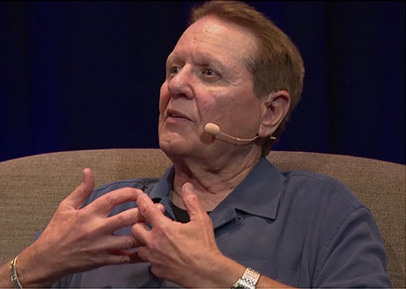
Bob Avakian (BA) is the most important political thinker and leader in the world today.
Click to read and download (PDF)
Click to read and download (PDF)
Watch BA’s whole speech:
Click to read and download (PDF)
